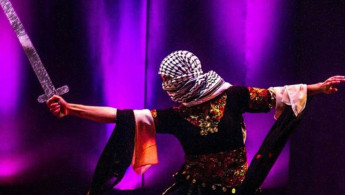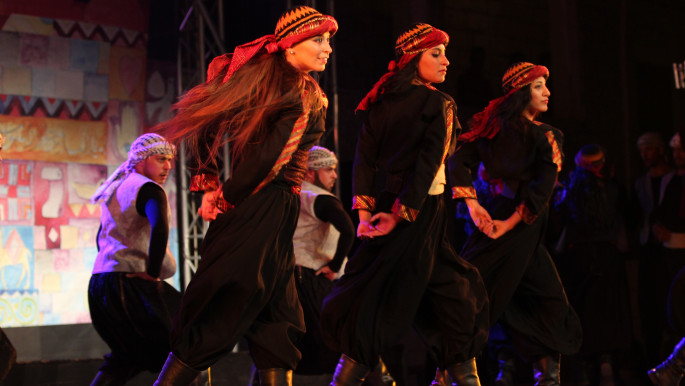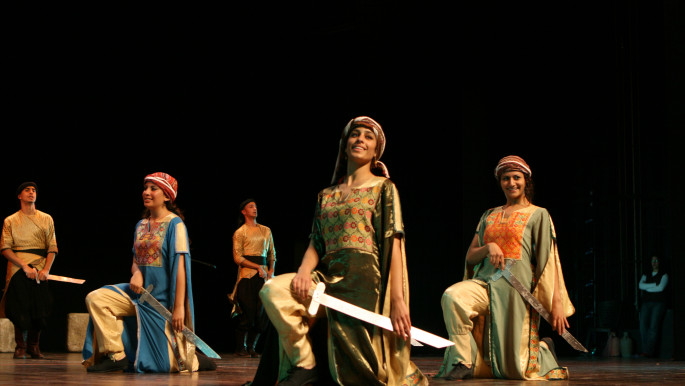When dancing could mean life and death: How one Palestinian troupe is resisting Israeli occupation
Established in 1979, El Funoun, which means 'The Art' in Arabic, is no ordinary dance collective. Since their inception, they have primarily been on a mission to resist the genocide of their people and culture.
This has been a task filled with danger and challenges. One of their members, Ata Khattab was imprisoned by the Israeli authorities on February 2. He has been kept in a prison without charge.
Noora Baker, Head of Artistic Production at El Funoun said: "Unfortunately the arrest of Palestinians is a common occurrence. People are arrested for simply being Palestinian, and being advocates for our culture and identity. Ata has been vocal about the treatment of our people, and he works to continue our traditions, as well as being popular with the community and young people. He has committed no crime."
Dancing in Palestine could literally mean life and death. The Israeli authorities view any expression of Palestinian culture and heritage as a threat, and one that could cost you everything.
Noora says, "In Palestine you are imprisoned for your ideas and your values."
El Funoun is committed to being a diverse community that includes men and women, children, Christians and Muslims. They are made up of volunteers, and have 230 members presently.
 |
In Palestine you are imprisoned for your ideas and your values |  |
"The dance performance deliberately involves large numbers of dancers, because it is part of the message of collective action, creativity and unity," Noora states.
Their activist ethos means they push boundaries. "We are an inclusive group," says Noora. "We recreate folksongs songs and produce our own choreography based on Arab-Palestinian folklore. We adapt these to represent the Christian, Muslim and minority communities in Palestine, and we always have women at the forefront."
"Our dances have roots in Palestinian folklore, and many of these have traditionally been practiced at celebrations and weddings. The dance styles have their own stories and origins that go back to even pre-Islamic times. Dance has always been present in our community as it is a form of everyday action. In traditional societies the movements would be inspired by working the land and the natural environment," adds Noora.
El Funoun incorporates these traditional moves, but adapts them to deliver a current message.
Music style and content heavily influences dance movements. In more recent history, Palestinian songs are heavily rooted in political resistance. Women are featured prominently in the songs and are portrayed as strong and willing to fight for their land (literally).
 |
Palestinian songs are heavily rooted in political resistance. Women are featured prominently in the songs and are portrayed as strong and willing to fight for their land |  |
Noora says: "We see our movement as reviving Palestinian heritage. All culture evolves through time, and this is what we are trying to be part of with El Funoun. We don't want to be stagnant; we value and respect our traditions, but we want to appeal to a younger audience as well as reflect our reality in the present time.
"In the diaspora, there is more of a need to preserve culture and freeze it in time. Whereas, we are living our culture every day, and we want it to evolve."
El Funoun are well known in Palestine, and have a big following. They are a symbol of hope for the people. Before coronavirus struck, they would perform at venues across Palestine and would have anything from 1,000 to 3,000 audience members. However, movement across the country is extremely difficult, even without the added restrictions caused by Covid-19.
The Israeli authorities make it very tough, but this group is not easily deterred by the Israelis nor by Covid-19. Practice has continued as best and as safely as possible.
 |
We use the stage to show that we exist and to preserve our history |  |
El Funoun have adapted to virtual dance sessions, which is not always accessible to everyone due to barriers with getting online. They have continued some limited face-to-face dance practice with smaller numbers and everyone wearing a mask.

El-Funoun are longing to return to performing live and taking their message across Palestine and the world. Sadly, life returning to 'normal' seems even further away for the Palestinians. While Israel is being celebrated across the world for its fastest vaccination campaign, the Palestinian people are being actively denied vaccines by the Israeli authorities.
I am sure that the story of how Palestinians have been treated over the pandemic will make its way into the El Funoun dance and music repertoire. As Noora says: "We use the stage to show that we exist and to preserve our history."
Nadia Khan is a historian and writer. She is the founder of Golden Threads: A project exploring shared history, culture and art across the Islamic world and beyond.
Follow her on Instagram @nadia.khan30







 Follow the Middle East's top stories in English at The New Arab on Google News
Follow the Middle East's top stories in English at The New Arab on Google News
![Netanyahu furiously denounced the ICC [Getty]](/sites/default/files/styles/image_330x185/public/2024-11/GettyImages-2169352575.jpg?h=199d8c1f&itok=-vRiruf5)
![Both Hamas and the Palestinian Authority welcomed the ICC arrest warrants [Getty]](/sites/default/files/styles/image_330x185/public/2024-11/GettyImages-2178351173.jpg?h=199d8c1f&itok=TV858iVg)
